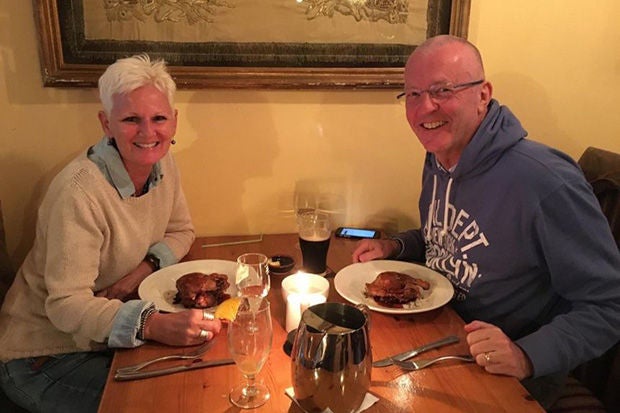
Mr Declan MacFadden lost his wife Anne MacFadden to glioblastoma three years ago. PHOTO: COURTESY OF DECLAN MACFADDEN
SINGAPORE - Researchers in Singapore have been awarded a $9.88 million grant to develop new diagnostic and testing options for glioblastoma (GBM), a type of brain cancer that is highly aggressive and deadly.
The potential benefits of this research project lie in being able to quickly and effectively identify the type of drug that should be given to GBM patients, and in the possible development of new drugs for GBM treatment, said Professor Patrick Tan of Duke-NUS Medical School.
GBM is difficult to treat due to its location in the brain, its structure, ability to spread quickly, high recurrence rate and limited treatment options.
"This generous funding gives us an opportunity to address the many challenges posed by this aggressive tumour," said Associate Professor Ang Beng Ti, head and senior consultant at the Department of Neurosurgery at the National Neuroscience Institute (NNI) @ Singapore General Hospital campus, and the project's principal investigator.
The grant was received under the Open Fund Large Collaborative Grant, which is supported by the National Research Foundation Singapore and administered by the National Medical Research Council. The team comprises researchers from NNI, the National University of Singapore (NUS) and Duke-NUS.
The latest advancements in GBM treatment have been welcomed by people like Mr Declan MacFadden, who lost his wife to GBM three years ago.
Mr MacFadden, 67, said that GBM took a physical and mental toll on his wife. It affected her eyesight and ability to walk, and she could forget conversations that happened in the last 30 seconds, he said.
Other common symptoms of GBM include severe headaches, seizures, and personality changes.
"It is a difficult journey, and there is no escape pathway out of this," said Mr MacFadden, who used to work in the flavours and fragrances industry.
After being diagnosed with GBM in January 2017, his wife died in February 2018. Even with treatment, most GBM patients do not live longer than two years after the initial diagnosis.
In Singapore, around 100 people are diagnosed with GBM every year.
But the research team hopes that its project can make GBM treatment more effective and personalised.
It is using artificial intelligence to discover drugs that are effective for GBM treatment, and part of this research involves working with London-based technology company BenevolentAI. So far, the team has identified one drug for clinical trials in 2022, said Prof Ang.
The team is also developing new blood tests to detect and monitor GBM. Assistant Professor Shao Huilin, from the Department of Biomedical Engineering and Institute for Health Innovation and Technology at NUS, said that the blood tests help to make treatment more personalised.
The blood tests can also be repeated to evaluate the progression of the disease and treatment efficacy for patients, unlike current clinical practices, which cannot be repeated easily, Prof Shao added.
Click here to read in Mandarin.
Contributed by














 Get it on Google Play
Get it on Google Play